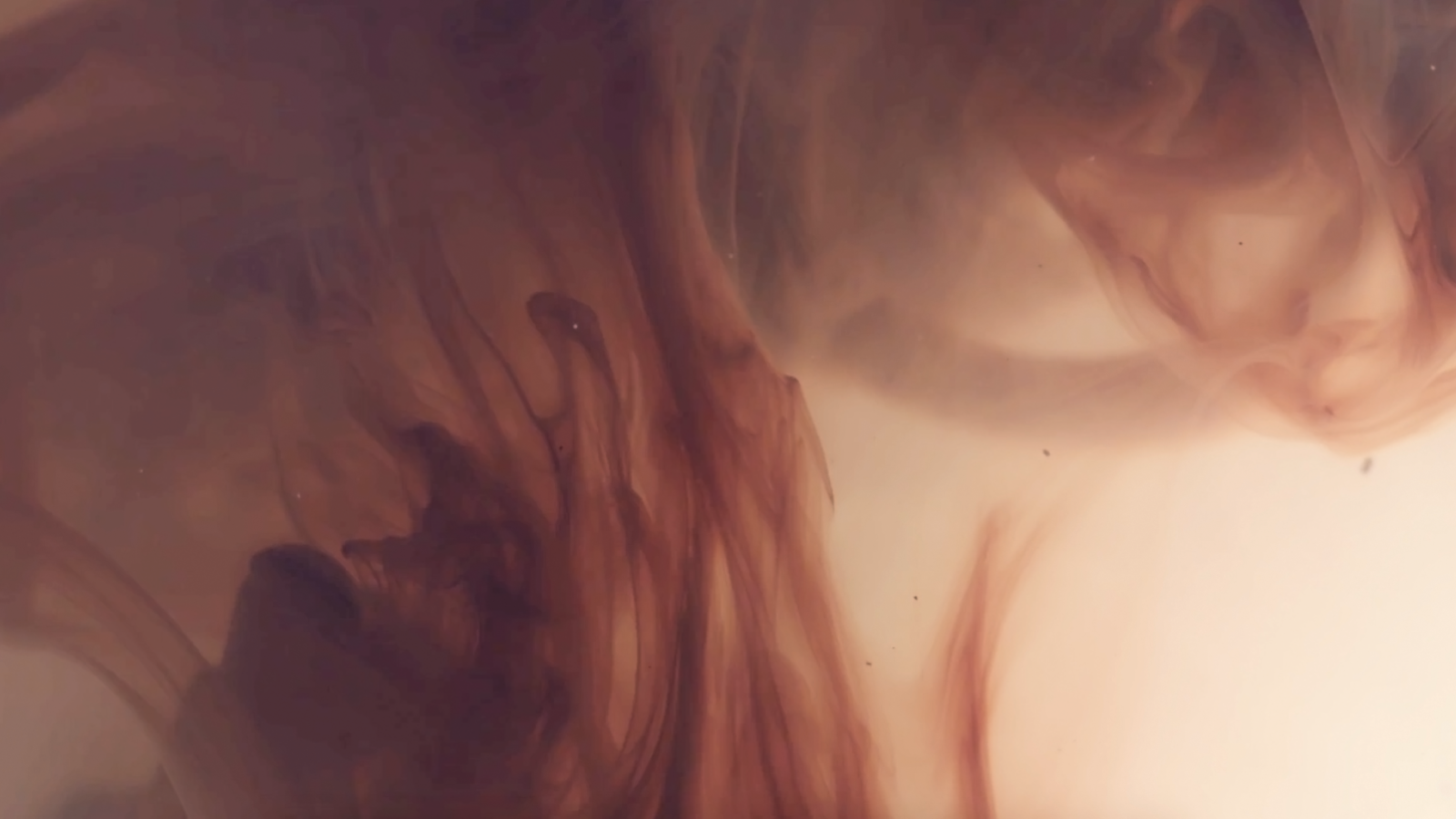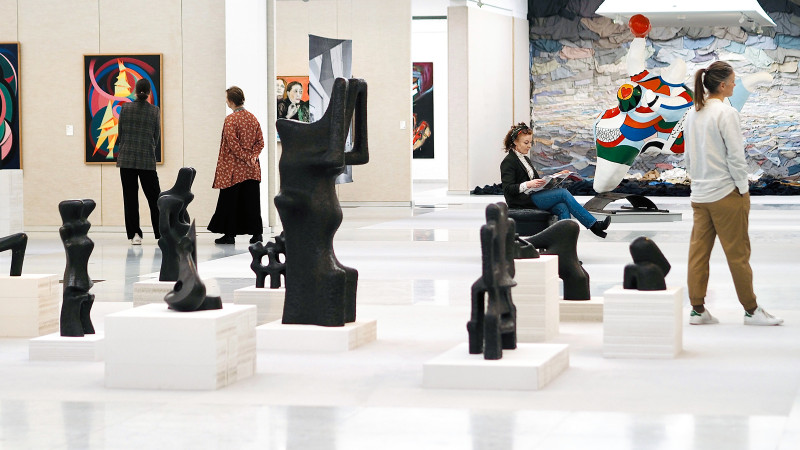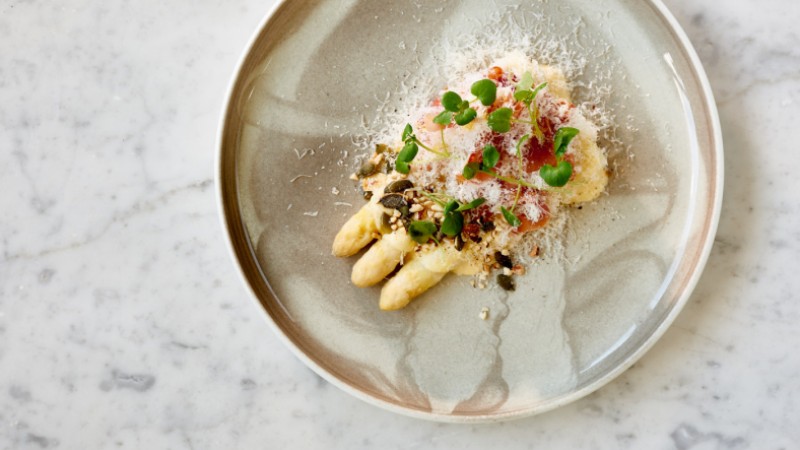
Filmklub: Poesi, kropsvæsker og fertilitet
Settle down with a drink in one hand and a bag of popcorn in the other. And get ready for a film evening of streaming fluids. In three incisive, poetic film works, the acclaimed British artist Lucy Beech investigates bodily, mental and poetic waste.
At this Kunsten Film Club, curator Søs Bech Sharpe will introduce you to the acclaimed English film artist Lucy Beech, whose works hover between documentary and fiction. The introduction will be in danish.
Brasserie Kunsten will treat you to a free bag of popcorn to nibble in the auditorium as you watch Beech’s films – maybe washed down by a lovely glass of wine or a soft drink.
Reproductive Exile (2018-23)
Running time: 30 minutes.
The film follows a patient in the commercial surrogacy industry, who comes in contact with a machine known as ‘Eve’ – a scientific prosthetic assigned to her as a personalised organ model. She confides in Eve, while swabbing, driving, and, injecting herself in what seems like a never-ending loop. Reproductive Exile is set in an unsettling place, somewhere between reality and fiction, linking research on the cultural, social and economic agendas of assisted reproduction to the experiences of the film’s perplexed protagonist. In a drug induced state she imagines the body conflated with the nonhuman others that facilitate her fertility treatment, including the pregnant horse, whose urine is a resource material for the pharmaceuticals she injects herself on a daily basis.
Language: English
No subtitles
Flush (2023)
Running time: 15 minutes.
In a mix of documentary, reenactment and poetry, Flush focuses on scientific endeavours of the early 20th century to define the human endocrine system. The short poetic film deploys a mixture of medical expressions and agricultural jargon that evolved as scientists, eugenicists, zoologists, farmers and sociologists attempted to use cows to formalise gendered normative values within human society. The film features a doctor performing a colour-coded ‘placental injection dye’ procedure which originated to study the flow of hormones between female cows and their male twins during pregnancy. These colourful flows revealed astounding levels of of admixture, and the intersex cow was labelled a ‘freemartin’. Contemporary Farmers still refer to freemartins as ‘waste’, given that their indeterminate sex characteristics, produced via an exchange of blood and hormones with a male twin, cast doubt on their ‘usefulness’ as agricultural products.
Language: English
No subtitles
Warm Decembers (2023-24)
Running time: 28 minutes.
The short, experimental film Warm Decembers reimagines a narrative poem by the American queer theorist Eve Kosofsky Sedgwick. At the end of the original poem, Sedgwick incorporates her creative waste in the form of notes (revisions, shifts, alternative plot lines). Unable to discard this work, her offcuts, she presents them in their fragmented state, referring to the process of writing poetry within the context of the actual poem. Borrowing from, and experimenting with the dissonance of the poem, the film is a constant interplay between language, music and imagery. Boundaries between states constantly collapse, and the treatment of waste is continuous and integrated. The film was based on exchanges with the literary theorist Cassie Westwood, who also appears in the film. Reflecting on her own gender reassignment, Cassie describes how Sedgwick’s ‘poetic waste’ helped her understand her own false starts as she works to integrate memories, desires, or identifications that she was led to believe were unacceptable – with the identity she was assigned at birth. Framed by Cassie’s personal experience of transition and Sedgwick’s notes, the film explores the productive potential of mental and poetic waste.
Language: English
No subtitles
About Lucy Beech
The UK artist Lucy Beech (b. 1985) is based in Berlin. Their practice involves collaboration and includes film, performance, choreography, research and authorship. The artist is currently investigating the meaning and potential of waste in different socio-cultural settings: including the links between waste materials and processes of reproduction. Beech has presented their works at institutions that include: Kunstinstituut Melly (Rotterdam); Donnaregina Contemporary Art Museum – Madre Museum (Naples); Lafayette Anticipations (Paris); the Liverpool Biennial; Tate Britain (London); Camden Arts Centre (London); and the Barbican Theatre (London) in collaboration with Edward Thomassen.
About Kunsten Film Club
Grab a free bag of popcorn, buy a glass of wine, choose one of numerous scrumptious snacks at Brasserie Kunsten, and then sit back for a very special encounter with contemporary art.
Kunsten Film Club is all about watching insightful, hard-hitting films in the company of others. The evening kicks off with a fascinating introduction by one of our curators, before we dazzle you, either with specially selected film works by some of the most interesting contemporary artists of our time, or with documentaries on artistic topics in collaboration with CPH: DOX
Datoer
Praktisk information
- Price:
- You only need to pay admittance to the museum to join the screening. With an annual pass you have free entrance - in many cases for both you and a guest.
- Brasserie Kunsten is treating you to a free round of popcorn to enjoy in the auditorium along with the film.
- There is a limited amount of seats for this event. If you want to secure a seat, you can do so for a fee of 20 dkk.
- The introduction of the artist is in danish, but the films are all english without subtitles.
- The fee for reservation of a seat is only refunded upon cancellation of the event.
Join Club Kunsten + Utzon

Join Club Kunsten + Utzon
Get free admission for you and a friend, world-class exhibitions, delicious food with a discount in Brasserie Kunsten, activities for kids of any age, discount in the museum shop and we could go on...
Complete you experience in Brasserie Kunsten

Complete you experience in Brasserie Kunsten
Complete your museum experience with a delicious visit to Brasserie Kunsten. Relax and enjoy good food and good company, while Brasserie Kunsten takes care of you.